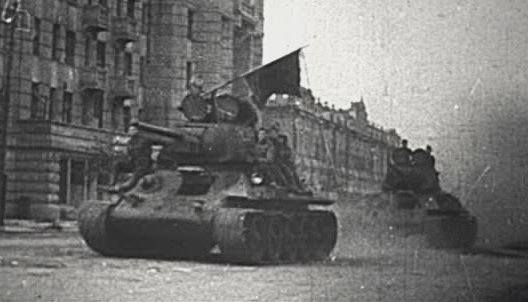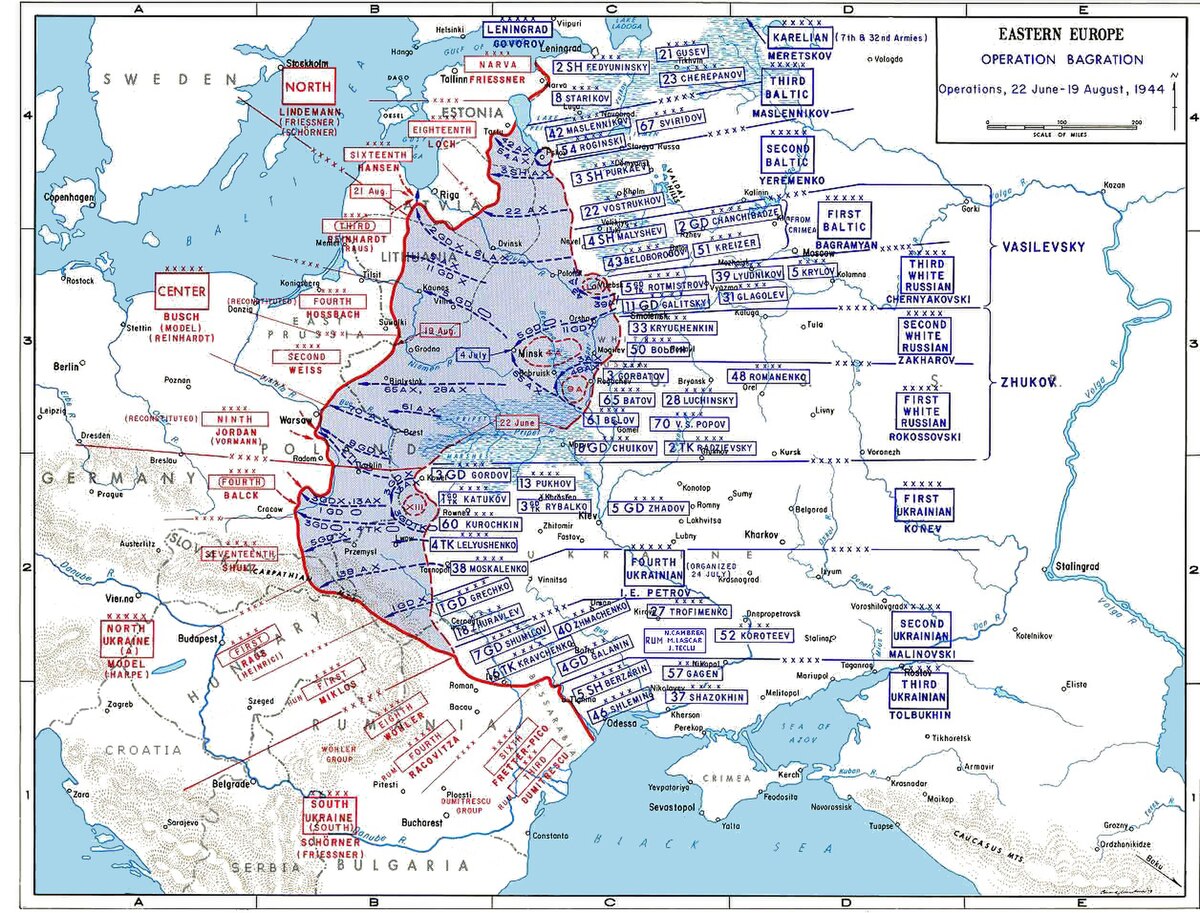You're assuming they'd still be concerned about a landing attempt after the storm disaster, why? The Germans had an idea of how many airborne troops the allies had and would knew that they'd lost nearly all of them in the failed invasion. Similarly everyone realized it would take a while to mount a new invasion after a failed one due to the sheer size of the entire operation and planning that went behind it, while in the meantime the V-weapons would be deployed and able to hit the ports where the invasions fleets had to stage out of. Plus as I said the bulk of the panzer divisions would stay in France as they weren't ready to deploy East yet anyway, which would be the hedge they'd need. Deploying 3 of the 10 Panzer divisions east along with some infantry is not an undue plan given the large remaining force.
Well they were still expecting a further invasion at Calais so difficult to know why they wouldn't still consider this a threat anyway.
The biggest element though would be the V-1s being deployed against the Channel ports which makes another invasion for 1944 out of Britain impossible.
The Wallies don't really have much of a choice but to wait given the V-weapon threat, loss of equipment, loss of their airborne (which the Allies refused to invade France without), and loss of faith in their own ability to launch another operation for a while. They were quite over cautious to minimize casualties for political reasons. It isn't outside the realm of possibility that they'd try another landing in the Mediterranean, but more likely due to the fall of Rome and faith in the coming operation in Italy that they'd 'reinforce success' by plowing more resources into Italy. That and support the Partisans in Yugoslavia more. Plus as you mentioned focus more on bombing to deal with the V-weapon threat.
This assumes that the V weapons are used against invasion ports, that their accurate enough and that they pick the right invasion ports. OTL they were targeted against London not the ports. They lacked great accuracy even without British counter-intelligence reducing that and Britain has a hell of a lot of ports. Remembering that a good chunk of the forces for Torch came straight from the US and the rest from the UK so its not necessary - albeit convenient - to use large ports nearest the planned landing zones.
Plus assuming for a minute that your accurate that's another good reason for considering what your insistent the US will refuse to do. I.e. land somewhere other than N France.
I know you're personally obsessed with the Balkans, much like Churchill, but that doesn't mean Stalin wanted that or the governments in the west would even be thinking about it with the V-weapon threat now front and center. You're making a lot of unsupported assumptions.
Stalin ultimately was a realist and primary concerned with his own position. If the situation was half as bad for Stalin as your suggesting and there's no hope of a landing in N France in 44 do you really think he would oppose allied landings in the Balkans, with the bonuses they give him and the damage to the Axis?
Which would bring him into the pro-landing camp, meaning the only opposition would be from elements in the US. Given how many spies and supporters your claiming for him in the US government and that there is now no alternative other than to sit on their asses for a year that should be possible.
Actually its you who's being obsessed that ONLY a landing in N France will be considered.
Let's say you're right. They suffer major losses from the first launch and call it off, saving the worst of the losses to the amphibious force. The airborne are still gone and the Allies would like around 20,000 men just from that as well as the ability to launch another invasion as the airborne divisions were a crucial element of that to block reinforcements headed to the beaches. No invasion will be possible for a while then anyway as a result and the V-1s against the Channel ports is an issue as of June 12th.
I'm not assuming that the entire para force would be sacrificed either given the proposed conditions. Neither British - especially after several years of war - nor Americans are Japanese fanatics who will blindly follow orders when they know they can't success.
What excess material? The Philippines operation was the one major victory in the Pacific after D-day and a major morale boost in the US. Zero chance it is cut whatever FDR's desires. More your wishful thinking on the matter than any actual version of US planning.
So your assuming that Roosevelt was weaker than Truman in 1950/51 when MacArthur threw his toys out of the pram? The US is a democracy, with political leadership not a military dictatorship, in either name or substance. Especially if the Soviets are struggling or there are signs they might look for a separate peace - whether the Nazis would agree to one being a different matter of course - that would be an additional incentive for them to look for ways to keep the pressure on the Germans, which they correctly realised were the major threat.
I came across a reference yesterday that one issue was that while the US were producing large numbers of Higgin's boats it was realised they were unsuitable for northern waters. Unfortunately the LSTs that were required were given a low priority in comparison - presumably because the US military preferred giving priority to the Pacific. However Higgin's boats would be practical for many operations in the Med.
Operation Anvil was. Dragoon was a different operation that evolved out of the proposed Anvil.
Overlord used up what was available in Europe, as both theaters had their allocations of resources planned out far ahead.
It was never planned to be a stand alone operation in case D-Day failed, since the OTL Dragoon and Anvil depended on success in Normandy to be viable.
Given how important airborne troops were to the Dragoon plan if insufficient air transports survived the D-Day attempt they'd not be able to launch it either.
Accurate but not relevant. I mentioned the operation as a sign that the allies hadn't rejected all landing operations in the Med.
You're basing that on...?
The Me262s were a success IOTL despite the disastrous situation by the time they got into significant operational numbers, but events overtook their ability to make an impact; without D-Day they had the time and room to develop into a major threat to bombers, which now have an intact continental air defense system to deal with and no escorts or jammers based on the continent or other safe routes through France into Germany. Similarly the Germans don't have to deal with the loss of their air defense system in western Europe after June 6th.
Yes the lack of a liberation of France strengthens the German defences against strategic bombing. However the daytime fighter force can still be bled white as OTL by the USAAF fighters as they seek to intercept the bombers. The Me262's still have issues with very short lived engines [due to lack of specialised metals], problems on landing due to a combination of heavy weight and unreliable synthetic rubber and their tendency to be fatal for inexperienced pilots. Even if they did manage to get numbers into service, which will consume further resources, they can't do a lot against night-time raids.
The Elektroboote were working out their flaws, hence one reason why they took so long to introduce; the other was the loss of economic resources in western and eastern Europe after D-day and Bagration. If they are able to reintroduce the battle of the Atlantic that is yet another diversion of resources the Allies need to make before they can refocus on invasion.
Are you talking about their design issues or their production issues? From what I've read they were being produced at multiple sources to be assembled in ports and a big issue was that many of the companies required to do the 1st production weren't able to produce the necessary accurate for the assemblies to match up reliably.
I'm not exactly sure what you're referring to. I never claimed they would on their own. It is US planners who were fearful if the Germans captured a relatively intact bomb they'd be able to reverse engineer it quickly and figure out their mistakes with their bomb project. I'm not claiming they'd be able to get one ready during the war, but given how opaque Allied intel on the German bomb project was they felt fearful of the possibility.
I was referring to one of the sources you quoted blithely suggesting that the Germans might produce nuclear weapons at a similar time scale as the western allies. Which by 1944 is really, really unlikely.
In the unlikely event that an A-bomb was captured, as its more likely to be destroyed if the a/c is shot down, it would still take a lot of time for the Germans to moblise the huge resources to produce a bomb. After all whether its a Pu or U device that shows that such an amount of material could be collected but would give no details as to how.
That there was some fear that the Germans might be closer than they actually are is a very, very good reason for the US to make sure that the priority is Germany not Japan.
He was popular, but I'd question the characterization of being widely popular as of 1944. He didn't get the US out of the Great Depression as the 1937-38 recession showed and he broke his promise not to get involved in another foreign war. People were also not excited about him running for a 4th term either, but because the war looked like it was nearly over by November 1944 he won easily; ITTL that would not be the case.
I think you're overestimating FDR's economic radicalism, all he did was save capitalism and arguably had a hand in stifling real radicals like Huey Long.
He got the US out of the vast bulk of the depression, when it looked to be on the verge of economic and social collapse after traditional policies had failed for 3+ years. There was a dip in 1937-38 which showed the problems weren't over but it was nothing like the disaster that the US was in at the start of 33. As such he seems to have been massively popular. Having a disaster like Overlord here would dent that somewhat but even if full details were made public, which is unlikely, there is still a war to win.
I also find it interesting that you don't think he was that radical when most right wingers tend to demonise him as the next thing to Stalin.
What OTL actions am I not allowing them to change? I'm saying what is logical given the circumstances based on a lot of planning. There was no back up plan if D-Day failed and it would take a while to come up with one, especially if insufficient landing craft survived. The loss of the airborne was bad enough.
Here is a historian's opinion:

What if D-Day had failed?
If D-day had failed and the troops were pulled off the beaches, what was plan "B"? Where there backup invasion plans of Europe? If so, what werewww.historynet.com
Your refusing to consider that the wallies, in the event of a failed Overlord landing, would consider anything but waiting a year and trying again.
Last edited:







